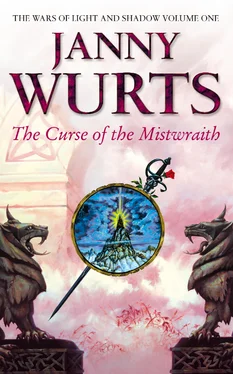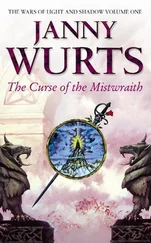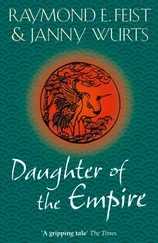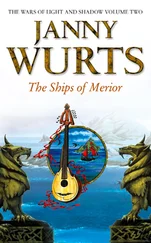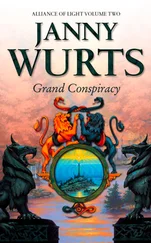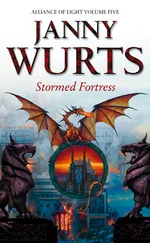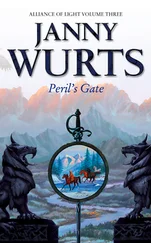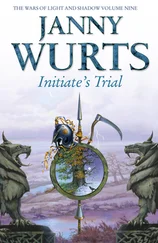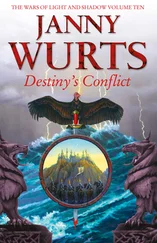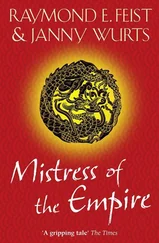Outside the cave the wind picked up, moaning through a stand of stunted pines. ‘Winter’s coming early,’ Felirin observed. ‘Seems to move in a little sooner every year.’
Unaware that such shifts in the seasons were the ongoing effects of Desh-thiere, he dumped his saddle over a log bench and sat, the skirt-flap a welcome backrest after exhausting hours astride. As Asandir’s efforts graced the cave with a curl of pale flame, the bard inspected his hands and cursed. The fingernails he needed to pluck his strings were split to the quick from shifting rocks. Arithon’s were no whit better and made bold by shared commiseration, Felirin gathered nerve and made inquiry.
‘I don’t recall any stanzas that mention a Master of Shadow.’
Asandir settled back, his face washed gold by flamelight. ‘That song has yet to be written.’ Gently as an afterthought, he added, ‘Felirin, it would not do to speak of this yet in the taverns. But you could see stars and sun within your lifetime.’
The bard gaped in astonishment, his glibness at a loss for reply. Asandir allowed the import of his words a moment to sink in. Then he said, ‘Lysaer and Arithon are the potential of a restored sky made real, the Mistwraith’s bane promised five centuries ago by Dakar’s Prophecy of West Gate.’
Caught dumbfounded, Felirin struggled to recover something resembling equanimity. He swore once, hoarsely. Then, left only his performer’s dignity, he said, ‘How many of the old ballads are not myth, but true history?’
‘Most of them.’ Asandir waited, his look gravely steady, as this became assimilated through another shaken interval of silence. ‘You are one of a chosen few who know.’
Dakar picked that moment to return, puffing under an armload of damp faggots. He had not bothered to shear off the dead branches, and his laziness had torn his better shirt. The ordinary intensity of his irritation became an anchor upon which Felirin hung sanity. Informed that his whole world stood poised on the brink of upheaval and change, the bard caught a shivering breath. ‘For the sake of one commonplace mortal, save the rest until after we’ve had supper. I’m hungry enough to hallucinate, and hearing the impossible doesn’t help.’
Later, warmed by leek stew and the coals of a generous bonfire, the sorcerer gave the history of Arithon’s sword. The tale was lengthy, beginning over eighteen thousand years in the past when twelve blades were forged at Isaer by the Paravian armourer, Ffereton s’Darien, from the cinder of a fallen star.
‘Ffereton was Ilitharis, a centaur,’ Asandir began. ‘The Isaervian swords were his finest, most famed creation, wrought at need to battle the vast packs of Khadrim that were the scourge of the Second Age. The histories that survive claim each blade took five years’ labour, a full decade if one were to count the sorceries that went into the sharpening. When Ffereton finished, the steel held an edge that time nor battle could blunt.’
Here, the sorcerer paused and asked Arithon to bare his blade from the scabbard. ‘You’ll see there are no nicks, no flaws from hard usage. Yet Alithiel has known the blows of two ages of strife.’ Asandir turned the quillons between his hands and firelight flashed on the inlay which twined the dark length of the blade.
‘The swords were given over to the fair folk, called sunchildren, for finishing. It was they who made the hilts and chased the channels for the inlay, no two patterns the same. But perhaps the greatest wonder is the metal set into the runes themselves.’ Asandir ran a finger over the inscriptions and as an answering flare of silver traced his touch, his voice softened into reverence. ‘Riathan, the unicorns, sang the great spells of defence. Masters of the lost art of name-binding, they infused the alloy with harmonics tuned to the primal chord of vibration used by Ath Creator to kindle the first stars with light. Legend holds that twenty-one masters took a decade to endow Alithiel alone.’
Asandir slipped the sword back in the scabbard with a soft sigh of sound. ‘The enchantment was balanced to peak in defence of the sword’s true bearer, dazzling the eyes of his enemy, but only if the engagement was just. Very few causes that drive a man to kill are righteous ones. Probably Arithon’s father never knew the nature of the weapon he left to his son.
Arithon confirmed this with a nod but did not speak. Haunted by his encounter with the sword’s arcane powers, he feared to betray the dread that partnered such mystery: that some role waited to be asked of him to match such a grand weight of history. Determined to control his own fate, the Shadow Master sat with locked hands while, with the skilled resonance of a storyteller, Asandir continued: ‘The Isaervian blades were crafted for the hands of six great Lords of the Ilitharis and the six exalted lines of the sunchildren. Alithiel was the oddity. She was forged for Ffereton’s son, Durmaenir, a centaur born undersized. The blade was tailored to match his proportions, from the length to the balance of the grip. In the wars that followed thousands of Khadrim died, their last memory the flaring brilliance of an Isaervian sword’s enchantment. Sadly, Durmaenir was one of the fallen. His grieving father passed Alithiel to the king’s heir.’
Arithon heard this and restrained a forcible wish to stop his ears, walk away, even shout nonsense; any reaction to halt this brilliant, weighty tapestry of names and sorrows far more comfortably left to the ghosts of forgotten heroes. Yet the stilled powers in the sword by their nature commanded his respect; he could not bring himself to interrupt.
If Asandir noticed Arithon’s distress, he held back nothing.
‘The prince at that time was a sunchild, and true to type for his kind, he stood just one span in height. The sword’s length reached nearly to his chin. He had a shoulder scabbard fashioned for ceremonial appearances and took up the traditional king’s blade upon accession at his predecessor’s death. Alithiel was given over to the line of Perhedral. They too were sunchildren, ill-suited to the weight of a large weapon. When King Enastir died childless the Teir’s’Perhedral claimed the kingship. Since another sword accompanied the crown, Alithiel remained in the treasury until another rise of Khadrim threatened peace. A centaur lord wielded her through the war that followed, but the blade handled like a toy in his huge grip. Afterwards, the sword Alithiel changed owners again, this time becoming the property of the high king’s cousin by marriage. It passed through his heirs to Cianor, who earned the honorific of Sunlord.’
This drew a gasp from Felirin who knew at least a dozen ballads made in praise of the Sunlord’s long reign.
Asandir smiled. ‘May the memory of those days never fade. Yet Cianor Sunlord did little but possess the sword. He assumed the Paravian crown in Second Age 2545, and as others before him, took up the king’s blade out of preference. By then Alithiel carried a second name, Dael Farenn, or kingmaker, because three of her bearers had succeeded the end of a royal line.
‘But if the sword brought kingship to her wielder, she never became a cherished possession. Awkward size made her handling a burden and though the Isaervian blades that survived the mishaps of time were coveted, no Paravian lord cared to claim one that carried a tragic reputation.
‘Cianor eventually awarded Alithiel to a man, for valour in defence of his sister, Princess Taliennse. Her Grace was rescued from assault by Khadrim in the very pass we just crossed.’ Here Asandir nodded in deference to Arithon. ‘The emerald in your sword was cut by a sunchild’s spells. The initial in the leopard crest changes with the name of the bearer, and since the blade fits the hand of a man to perfection, each heir in your family has carried her since.’
Читать дальше
